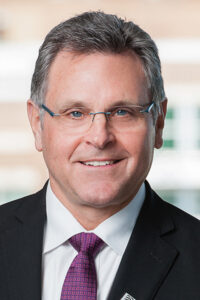
The ICU can be a complex and challenging place to work and is among the settings with the highest rates of burnout among health care workers. Understanding and addressing the drivers of burnout is key to mitigating it, according to Curtis N. Sessler, MD, Master FCCP, who will deliver the Presidential Honor Lecture, Navigating the Road to Well-Being in the ICU, on Monday at 11:00 am CT.
Dr. Sessler is the Orhan Muren Distinguished Professor of Medicine, Division of Pulmonary and Critical Care Medicine, Virginia Commonwealth University Health System, a Past President of CHEST (2014-2015), and a new Master FCCP (2021). He co-led a multi-society task force on burnout in the ICU and has written and lectured extensively on the topic.
“This is an area of really great importance, not just to physicians, but to all health care workers, particularly those working in the ICU,” Dr. Sessler said. “And while there is certainly greater relevance for this topic in the past year and a half, the pandemic only accelerated what has been a longstanding problem.”
Among the key drivers of burnout are heavy workloads and increasing job demands, inefficiency and lack of resources, work-life imbalance, and the impact of organizational culture and values.
In his lecture, Dr. Sessler will use the analogy of passengers in a vehicle trying to successfully complete the ICU journey while negotiating a winding road with hazards at every turn.
“You might encounter things like road closures, where you have to pivot very quickly, just as we all did when the pandemic hit and standard operating procedures were turned upside down,” he said. “And during the journey, you also have to deal with ‘potholes’—like heavy electronic medical record requirements or other annoyances that can cause stress and slow your progress.”
It’s not just about a single individual dealing with and overcoming the hazards of the road, though, Dr. Sessler said.
“You’re not in the car alone. There are other occupants—the entire ICU team—so there is opportunity for each of us to provide care on a personal level, both self-care and care of our teammates,” he said. “Importantly, there are also organizational opportunities for policymakers and leaders in health care and our hospitals to recognize the important problem of burnout and help move us in the right direction, both collectively and individually.”
NOW IN SESSION
CHEST 2021 • OCTOBER 17-20 • INFORM. INSPIRE. INNOVATE.
Immerse yourself in the experience of CHEST 2021! Your registration includes hundreds of sessions presented by our top faculty and featured speakers, live discussions with the experts, interactive gaming, and much more. Even better, you’ll have access to everything (including post-meeting bonus content) until October 2022!
Haven’t registered yet? It’s not too late. Register now for full access.





